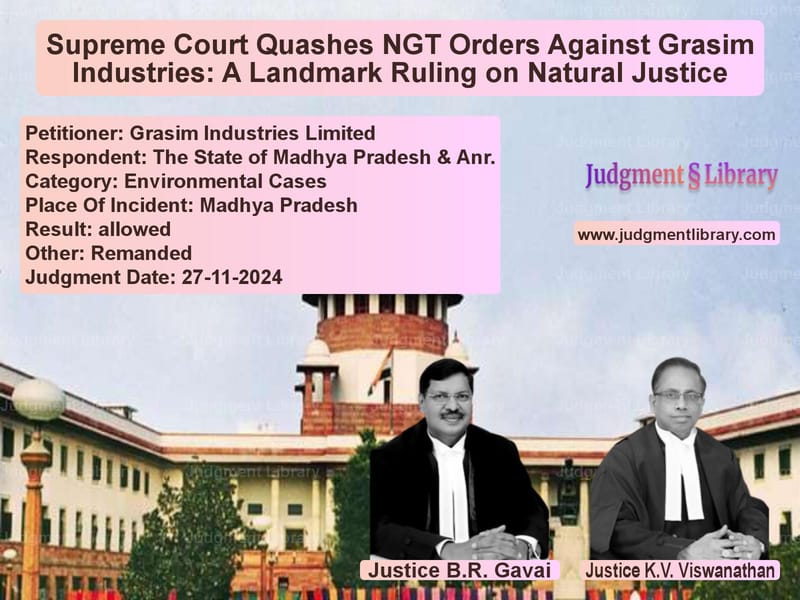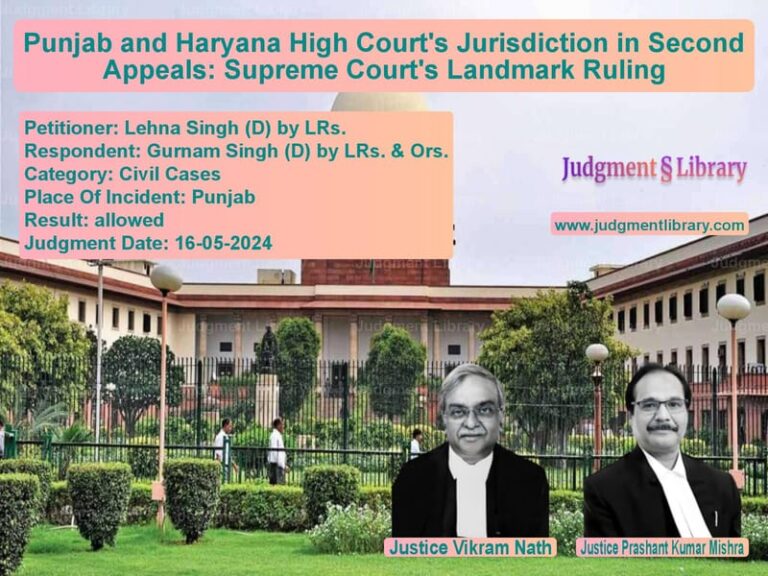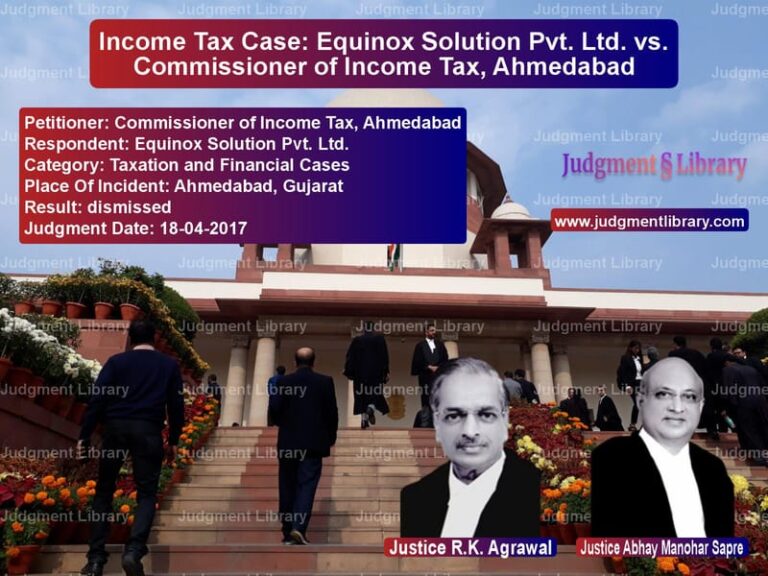Supreme Court Quashes NGT Orders Against Grasim Industries: A Landmark Ruling on Natural Justice
The Supreme Court of India, in a landmark judgment, ruled in favor of Grasim Industries Limited by quashing the penalty imposed by the National Green Tribunal (NGT). The judgment in Grasim Industries Limited vs. The State of Madhya Pradesh & Anr. emphasizes the principles of natural justice and the necessity for fair hearings before imposing penalties.
Background of the Case
The case arose when the National Green Tribunal (NGT) imposed penalties amounting to ₹75 lakh on Grasim Industries Limited for alleged violations of environmental norms. The company was accused of:
- Failing to install online flow meters in CS₂ (Carbon Disulfide) stacks to quantify emissions.
- Producing acid as a by-product, which was hazardous to the environment.
- Operating in violation of the Environment Protection Act, leading to penalties.
Grasim Industries approached the Supreme Court, arguing that it was never given an opportunity to present its case before the NGT imposed the penalties.
Legal Issues Raised
- Did the NGT violate the principles of natural justice by penalizing Grasim Industries without giving it a hearing?
- Was the NGT justified in relying solely on a Joint Committee report without independent verification?
- Was the NGT’s approach legally sustainable?
Petitioner’s Arguments
- Grasim Industries contended that it was not made a party in the proceedings before the NGT.
- It argued that its application for impleadment was rejected, thereby denying it the opportunity to defend itself.
- The Joint Committee did not issue any notice to the company before submitting its report.
- The NGT based its findings entirely on the committee’s report without independent assessment.
Respondent’s Arguments
- The State of Madhya Pradesh, through its Pollution Control Board, argued that the violations were established through expert reports.
- The NGT had jurisdiction to rely on expert opinions for environmental protection.
- The penalties were proportionate to the nature of violations and necessary for enforcing environmental norms.
Supreme Court’s Analysis
1. Violation of Natural Justice
The Court observed that the NGT imposed penalties without hearing Grasim Industries. It ruled:
“The approach adopted by the NGT smacks of condemning a person unheard. The appellant was neither issued a notice nor given an opportunity to respond.”
The Supreme Court reaffirmed that tribunals and regulatory bodies must follow procedural fairness.
2. Reliance on an Expert Committee Without Independent Assessment
The Court held that tribunals must exercise independent judgment and not rely solely on external reports. It stated:
“The NGT cannot outsource an opinion and base its decision on such an opinion without independent application of mind.”
The Court criticized the NGT’s reliance on the Joint Committee report without considering rebuttals or explanations from Grasim Industries.
3. The Right to Be Heard
The Court reiterated that tribunals must adhere to procedural fairness and ensure all affected parties are heard. It ruled:
“Tribunals exercising quasi-judicial functions cannot decide matters in the absence of affected parties.”
The ruling emphasized that even environmental protection cases must follow due process.
Final Judgment
- The Supreme Court quashed the NGT’s orders imposing penalties on Grasim Industries.
- The matter was remanded back to the NGT for fresh consideration.
- The NGT was directed to ensure that the company was impleaded as a party before proceeding further.
Implications of the Judgment
- Strengthening Natural Justice: The ruling reinforces the right to be heard before imposing penalties.
- Checks on Environmental Tribunals: It ensures that tribunals do not rely blindly on expert committees.
- Setting Precedents for Corporate Defenses: Companies must be allowed to defend themselves before environmental penalties are enforced.
- Fair Implementation of Environmental Laws: The decision prevents arbitrary enforcement of environmental laws without due process.
Conclusion
This judgment sets a crucial precedent in environmental law, ensuring fairness in adjudication and reinforcing procedural justice. It highlights the importance of natural justice and prevents regulatory overreach in the name of environmental protection.
Petitioner Name: Grasim Industries Limited.Respondent Name: The State of Madhya Pradesh & Anr..Judgment By: Justice B.R. Gavai, Justice K.V. Viswanathan.Place Of Incident: Madhya Pradesh.Judgment Date: 27-11-2024.
Don’t miss out on the full details! Download the complete judgment in PDF format below and gain valuable insights instantly!
Download Judgment: grasim-industries-li-vs-the-state-of-madhya-supreme-court-of-india-judgment-dated-27-11-2024.pdf
Directly Download Judgment: Directly download this Judgment
See all petitions in Public Interest Litigation
See all petitions in Environmental Cases
See all petitions in Judgment by B R Gavai
See all petitions in Judgment by K.V. Viswanathan
See all petitions in allowed
See all petitions in Remanded
See all petitions in supreme court of India judgments November 2024
See all petitions in 2024 judgments
See all posts in Environmental Cases Category
See all allowed petitions in Environmental Cases Category
See all Dismissed petitions in Environmental Cases Category
See all partially allowed petitions in Environmental Cases Category







